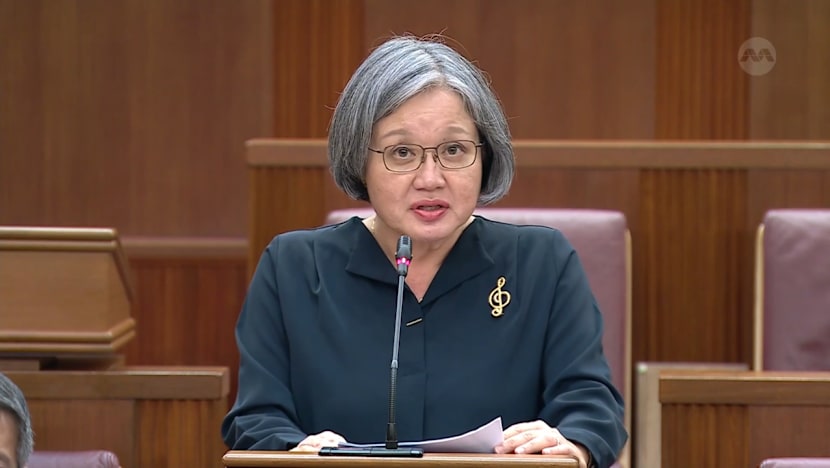'Competitors but not enemies': Sylvia Lim says PAP and WP share duty to Singaporeans
The Workers’ Party is “cautiously optimistic” that Singapore’s parliamentary system has the potential to do better, said the party chair.

Workers' Party chair Sylvia Lim speaking in parliament on Sep 26, 2025.

This audio is generated by an AI tool.
SINGAPORE: Both People’s Action Party and Workers’ Party members are in parliament as competitors, but not enemies, said Ms Sylvia Lim in parliament on Friday (Sep 26), adding that both parties have “common cause”.
“The people have elected us to act on their behalf, to ensure Singapore endures for the long term,” said Ms Lim, who is also the party chair.
Ms Lim (WP-Aljunied) was speaking on the fifth day of the debate on the President’s Address. She and Mr Kenneth Tiong (WP-Aljunied) were the two opposition MPs slated to speak.
In her speech, Ms Lim recounted attending a parliamentary sitting in the UK last month.
She recalled a government minister from the ruling Labour Party "painstakingly explaining" how the British police had upheld democratic values while policing a mass protest on the Gaza situation over the weekend in London.
On this, a shadow minister from the Conservative Party – the main opposition in the UK – sought an assurance from his political opponent on the police actions, stating that if the assurance was given, he would accept it.
“That moment set me thinking hard. Political competitors, yet able to give each other some credit and credibility,” she said.
Ms Lim said that she has the same hope for Singapore’s parliament.
“Politics is competitive, but why are we in this? I would like to believe that the main motivation is a calling to serve the public in elected office, a calling that is most meaningful and noble,” she said.
In this term of parliament, Ms Lim said she hoped that MPs could build trust in the house.
“At the very minimum, we should remember that all colleagues here are fellow Singaporeans who have made a choice to leave our comfort zones to take up national office,” she said.
She added that MPs should believe that a fellow MP has “good motivation” even if they may disagree with them. If so, Singaporeans will benefit from a focus on the issues that matter, she added.
In seeking clarifications from Ms Lim, Mr Victor Lye (PAP-Ang Mo Kio) first agreed that PAP and WP have the “common cause” to serve Singaporeans. He added that they are “not enemies” but friends, and have “known each other for a long time”.
Referencing Ms Lim's UK anecdote, he asked whether Ms Lim aspires to a different system, as she had cited another parliament as an example.
While she does not aspire to another system, the WP MP replied, she believes Singapore’s system can “still do better”.
“What was most striking to me was that momentary expression of trust in each other. In the last few days, I see some flashes of that, but I hope it can be sustained,” she said.
DUTY TO CONSTITUENTS
Ms Lim said that as MPs, their overriding duty is not to their political parties, but to Singaporeans.
“Regardless of our affiliation, we have a duty to speak for our constituents and ensure that this chamber works for them,” she said, adding that this means “questioning the government” and holding it to account “rigorously, if necessary”.
The government should also always demonstrate that it is “sharing as much information as possible”.
“And in the long run, it is Singaporeans who need to decide if the balance of power in the house should be changed,” she said.
In her speech, Ms Lim cited the results of a 2024 ranking by the World Justice Project, which compiles an index of countries centred around four principles: accountability, just law, open government, and accessible and impartial justice. Singapore ranked 16th out of 142 overall.
While Singapore had “largely healthy scores” across six out of eight indicators, the country did not fare as well in the other two.
The two indicators were “open government”, which measures how much information is shared by the government and public accountability, as well as “constraints on government powers”, which measures how far those who govern are bound by law, she said.
A likely reason for these results may be the “imbalance” in parliament, with almost 90 per cent of seats filled by the ruling party, she said.
“We respect the outcome of the elections. That said, it is a fact that in the house, the government agenda is set by the leaders of the ruling party, and party discipline demands that ruling party MPs vote in support of the government agenda,” she said.
As opposition MPs, they are expected to “take an independent line”, she said.
“Speaking from experience, this is not easy, especially when one is surrounded and vastly outnumbered. But that is our obligation and that is what voters expect us to do.”
She added that opposition MPs will play a part in building a parliament that is trusted by the people.
“We are cautiously optimistic that our parliamentary system has potential to do better.”















